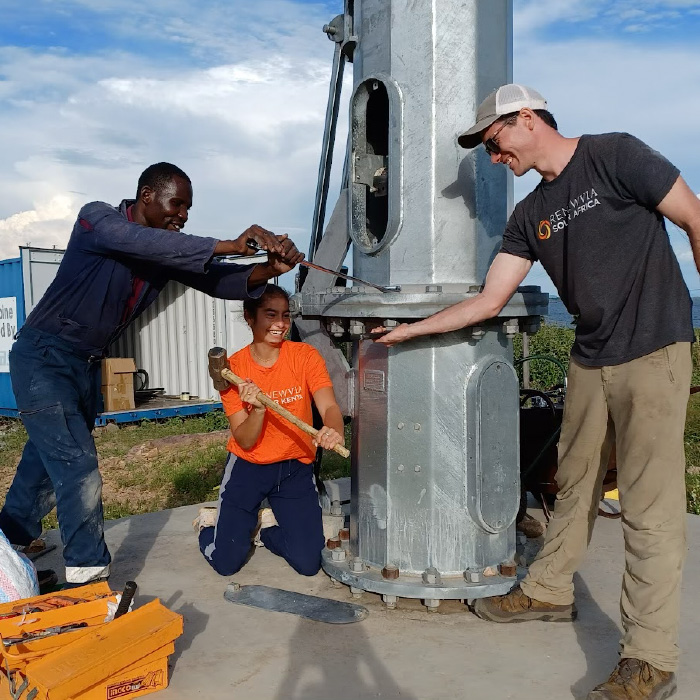My interest in sustainability began at a young age: My Quaker school upbringing instilled in me the principles of community, equality, and stewardship. These values drove my involvement in diversity, equity, inclusion, and sustainability, with a focus on environmental justice. As I continued to delve into topics like land, soil, and agriculture access in the United States, my passion for a career at the intersection of sustainability and equity solidified. I recognized the potential to create a career of impact in this space.
At Georgia Tech, as a member of the Stamps President’s Scholars Program and the Ray C. Anderson Center for Sustainable Business community, I found the perfect environment to nurture my aspirations to craft a career, network, and life of progress. Through these networks, I connected with Tech alumnus Nick Selby (ME ’16). Nick is VP of engineering for the Solar Africa division of Renewvia, a company that installs clean energy infrastructure, specifically solar microgrids, to expand electricity access in Sub-Saharan Africa. After learning about this company’s impactful work, I spoke with Nick about ways I could potentially contribute to their impact in Africa – and learned that I could take part in an internship.
When the Spring 2024 semester ended at Georgia Tech, I could not wait to travel to Nairobi, where I would be spending two and a half weeks. I was excited to visit Africa for the first time and to contribute to Renewvia’s carbon trading platform and impact reporting. My internship with Renewvia Solar Africa in Kenya turned out to be one of the most meaningful and impactful experiences of my life, allowing me to grow both personally and professionally.
First Impressions and Early Experiences
After arriving in Nairobi following 36 hours of travel, Nick shared his plan for the coming morning, which included his recurring Saturday Python session in Kibera. Despite exhaustion from travel and Nick’s skepticism for my ability to wake up and fight jet lag, I leaned into both my curiosity and excitement to explore new communities and make worldwide friendships as well as my passion for teaching and equity. Within my first 12 hours in Nairobi, I visited Kibera, the largest urban slum in Africa, to kick off my journey in Kenya by playing a role in advancing technical education across the globe.
Teaching Python fundamentals to a group of eager students, and just slightly older than myself, in a cramped room opened my eyes to the vast disparities in educational resources across the world. Seeing print(‘Hello World’) (a simple computer program) written on the whiteboard in Kibera, a lesson I had learned in the comfort of Georgia Tech’s well-equipped facilities, underscored the privilege I often take for granted. This moment was a powerful reminder of the inequalities that exist and fueled my determination to contribute meaningfully during my internship.
I answered the students’ questions on indexing and slicing, using real-world metaphors to explain concepts. I also talked to them about more personal matters. The students wanted to learn more about me. They asked me about my reasons for visiting and wanted to know little details about my life and home. They shared recommendations for my stay and eagerly asked when I would return. Everyone was beyond welcoming.
Esther, a 28-year-old student, left a lasting impression on me. She had left her home in Kisumu to live with her aunt in Kibera in order to attend these classes. She clearly has the drive to grow her knowledge for a future career. I’m excited that she and I are staying connected on WhatsApp. I get to hear how her classes are going, and she checks in on how I am doing.
This teaching experience inspired me to facilitate a new connection with the Georgia Tech College of Computing. My past professor, David Joyner, Nick, and I met to discuss opportunities for increasing access to educational courses in computing in Kibera. Our conversation led to Joyner’s Introduction to Python Programming course being made accessible free of charge to the students in Kibera. This is the exact course that is offered to Georgia Tech students, and the class that sparked my passion for computer programming.
I was thrilled to hear that since I’ve returned home to the U.S., Esther and the rest of the students in the course have been continuing their education by progressing through the asynchronous Python modules. Access to this online learning has dramatically improved the programming course experience for the whole class!
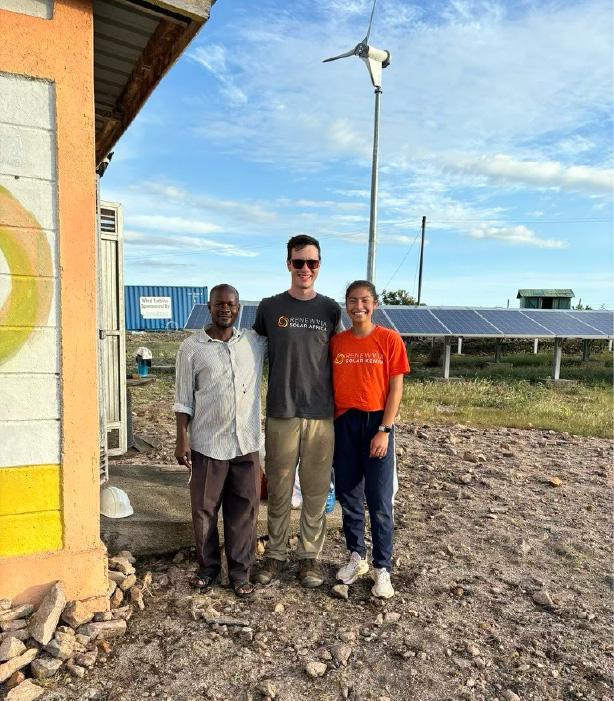
Work and Impact
During my time with Renewvia, I worked on various deliverables, including enhancing their carbon trading platform using blockchain technology. Leveraging my coding skills from Georgia Tech and new familiarity with a new programming language, Solidity, I improved the platform’s transparency and verification processes. With events coding in Solidity, I enabled the inclusion of all data necessary to validate the number of credits issued on the public blockchain, linking proof of verification to the carbon trade transaction to address several issues of carbon markets. This innovative approach has the potential to revolutionize the carbon markets community, making carbon trading more accessible, effective, and trustworthy, while increasing equity for smaller-scale projects.
In addition to technical work, I provided insights and recommendations for Renewvia’s impact reporting. During my visit to Ndeda Island in Lake Victoria, where Renewvia’s onsite mini-grid and wind turbine is the sole-provider power for the community of approximately 400 residents (including their medical center and school), I conducted qualitative interviews to gather follow-up data for their impact assessment. When asked how he felt about recent access to energy, Otieno, a community member, said, “It changed my lifestyle,” emphasizing my understanding of the true impact of energy access.
Otieno, a new business owner, is one of many residents on Ndeda who has experienced the shared and vast positive changes since Renewvia arrived two years ago. He told me that the introduction of electricity brought new businesses, improved safety, and enhanced educational opportunities. Otieno and other residents’ stories of how electricity transformed their lives were profoundly moving, giving me a new understanding of what access to power means. Renewvia’s work and dedication to bring electricity to powerless areas of Sub-Saharan Africa gave me a new perspective on the impact of solar transition that reaches far beyond one mini-grid. The introduction of electricity brought new businesses, improved safety, and enhanced education opportunities to the community. Access had also drastically improved gender equity, safety, and public health.
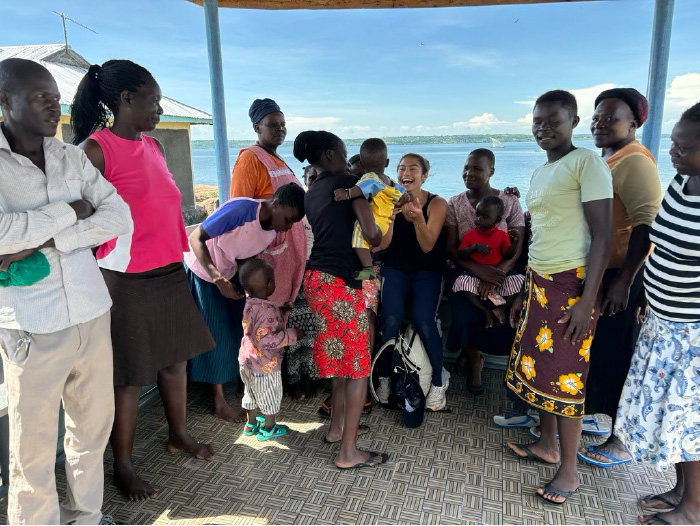
Cultural and Professional Growth
Outside of work, I explored Kenya: the Maasai Mara, Diani Coast, Lake Victoria, and cities like Nairobi and Kisumu. I connected with local leaders in the solar industry, forming relationships that will be invaluable for my future career. Meeting individuals like Tom Vranken of SunCulture and Anthony Mabonga of Bboxx broadened my understanding of the clean energy landscape in Africa.
Kenya’s vibrant culture and the warmth and pride of its community made a lasting impression on me. I will never forget eating Kenya’s staple foods, ugali and homemade chapati, served with nyama choma. I can still see in my mind’s eye the beautiful sights across Kenya, such as the beautiful white sand beaches of Diani on the coast, where the turquoise water flows calmly to meet the shore.
I will remember stories from individuals I met from all over the world, each pursuing a greater impact in the world. For example, I met Millie who volunteered as a teacher outside of Mombasa and Hanna from Germany who was on her way to volunteer near Mount Kenya at a refuge center for women escaping domestic violence. I also met Salim, a divemaster interested in starting a hospitality business on Diani; Ivy, a hotel worker on Diani with the kindest smile and love for dancing; and CeCe, who works in obstetrics and gynecology at a hospital. Through these encounters and more, I gained a deeper appreciation for the diverse ways people around the world are striving to create positive change.
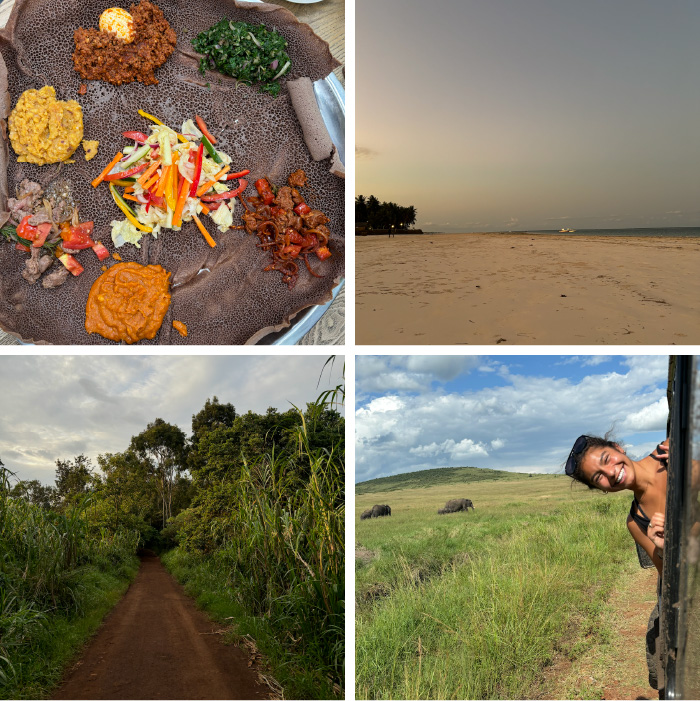
Takeaways and Future Aspirations
My internship with Renewvia Solar Africa was a transformative experience I will never forget. It not only solidified my commitment to sustainability and equity but also boosted my confidence in my professional abilities. I am grateful to Nick and the Renewvia team for their support and the opportunity to make a tangible impact as I continue carving out my future career path.
Moving forward, I aim to leverage my experience in Kenya to foster connections between Georgia Tech and organizations like Shofco, promoting computer science education globally. I am equally excited about the potential to expand my work in sustainability and clean energy, using my skills and insights to drive progress and equity worldwide.
The variety of activities, perspectives, and new skills I developed in Kenya broadened my horizons, deepened my commitment to sustainability, and equipped me with the skills and confidence to pursue a career dedicated to creating a more equitable and sustainable world. I look forward to leveraging my growth from this opportunity to continue leading progress and service in my future.
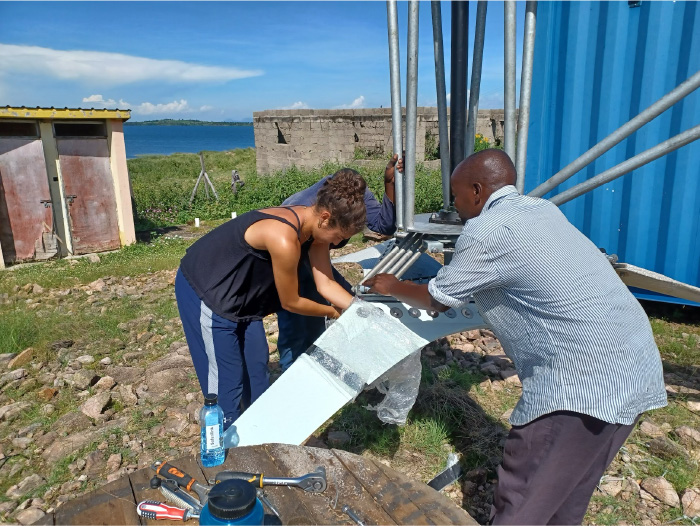
About the Author: Amanda Ehrenhalt is a third-year Stamps President’s Scholar and industrial & systems engineering major at Georgia Tech. As someone with a deep passion for impact, she served as a 2023-24 Undergraduate Sustainability Ambassador at the Ray C. Anderson Center for Sustainable Business and completed a year-long project on expanding the inclusion of the UN Sustainable Development Goals in the curriculum. She is involved in Georgia Tech Athletics, Student Government, Student Ambassadors, and hopes to use her time in college to improve collaboration and impact within the Tech community. Amanda looks forward to exploring possible career paths at the intersection of clean energy and equity to create impact throughout the entirety of her life. She thanks the Ray C. Anderson Center for Sustainable Business and the Stamps President’s Scholars Program for funding to help her pursue her internship in Kenya. She is also grateful for David Joyner and the College of Computing’s interest in connecting with Shofco in Kibera, and for support from Nick Selby from Renewvia Solar Africa.
Supporting Students: Philanthropic support for scholarships like the Stamps President’s Scholars Program makes it possible for Georgia Tech to recruit the brightest, most talented students from around our state and around the world. Support students today.
